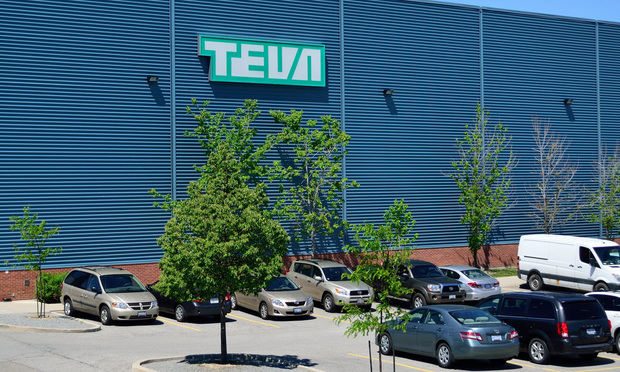Federal Circuit Upholds Del. Decision Erasing Teva Patents for MS Drug
A federal appeals court upheld a Delaware judge's decision that invalidated four patents for Teva Pharmaceutical's Copaxone, clearing the way for competitors to bring generic versions of the company's multiple sclerosis drug to market.
October 12, 2018 at 04:58 PM
4 minute read
 Photo Credit: Raysonho/Open Grid Scheduler/Grid Engine via Wikimedia Commons
Photo Credit: Raysonho/Open Grid Scheduler/Grid Engine via Wikimedia Commons
A federal appeals court on Friday upheld a Delaware judge's decision that invalidated four patents for Teva Pharmaceutical's Copaxone, clearing the way for competitors to bring generic versions of the company's multiple sclerosis drug to market.
The decision, from the U.S. Court of Appeals for the Federal Circuit, affects a contingent of drugmakers in New Jersey and Pennsylvania, which had applied to develop generic alternatives to the thrice-weekly, 40-milligram treatment for relapsing-remitting MS. The firms were represented on appeal by Deanne Maynard of Morrison & Foerster in Washington and Shannon Bloodworth of Perkins Coie, who practices out of Washington and Madison, Wisconsin.
Teva had sued the companies—including Mylan, Sandoz and Amneal—in 2014 in the U.S. District Court for the District of Delaware alleging infringement of its patents, which expire in 2030. The cases were eventually consolidated, and the parties waged a seven-day bench trial in September.
Former U.S. District Judge Gregory M. Sleet of the District of Delaware, however, invalidated Teva's patents in January 2017, finding that it would have been “obvious to try” to improve on earlier treatments that required daily injections of glatiramer acetate, Copaxone's active ingredient. Teva, Sleet said, had not invented the new product, but had “simply won the race to the patent office.”
On appeal, Teva, whose North American operations are headquartered in North Wales, Pennsylvania, challenged Sleet's “obvious-to-try” analysis and argued that the judge improperly relied on hindsight to reach his conclusion.
But a three-judge panel of the appeals court disagreed. In a 32-page opinion, the Federal Circuit found that market pressure and a limited number of suitable alternatives to Copaxone's precursor had rendered Teva's solution obvious.
“The district court had ample evidence besides hindsight and the disclosures … on which to find a thrice-weekly dosing regimen of 40-mg [glatiramer acetate] obvious to try,” Judge Jimmie V. Reyna wrote for the court.
Reyna's opinion cited multiple studies from the early to mid-2000s showing that glatiramer acetate, administered three times a week, would be more effective and cause less side effects than daily treatments of the lower 20-milligram dosage. According to the opinion, only the 20-milligram and 40-milligram doses had clinical support for being safe and effective at the time.
“This is not a situation where the prior art gave no direction in how to reach a successful result; the prior art clearly indicated that less frequent doses should be explored and that higher doses, while maintaining the same weekly dose, could increase efficacy while not affecting adverse reactions,” Reyna said.
Mylan, headquartered in Canonsburg, Pennsylvania, said the case was the last infringement suit it was facing related to its planned generic.
“Today's decisions are important milestones as we continue to focus our efforts on meeting the needs of multiple sclerosis patients in the U.S. with Mylan's more affordable treatment option,” the company said in a statement.
A spokeswoman for Teva did not return a call Friday afternoon seeking comment on the ruling.
The ruling comes as Teva is already facing increased generic competition for Copaxone, its highest-selling specialty drug. The U.S. Food and Drug Administration last October approved a generic version of its 40-milligram treatment, which was considered an “at-risk” launch pending final resolution of its infringement lawsuits. Two generic versions of its 20-milligram Copaxone treatment have also been approved.
Overall, Copaxone accounted for nearly $3.8 billion in global revenues last year, according to the Teva's regulatory filings.
Sandoz, a German company, bases its U.S. operations in Princeton, New Jersey. Amneal makes its headquarters in Bridgewater Township, New Jersey, and has administrative offices in Fort Washington, Pennsylvania.
Additional defendants Dr. Reddy's Laboratories Ltd. and Pfizer Inc. are headquartered in Princeton and New York City, respectively.
The case is captioned In re: Copaxone Consolidated Cases.
This content has been archived. It is available through our partners, LexisNexis® and Bloomberg Law.
To view this content, please continue to their sites.
Not a Lexis Subscriber?
Subscribe Now
Not a Bloomberg Law Subscriber?
Subscribe Now
NOT FOR REPRINT
© 2025 ALM Global, LLC, All Rights Reserved. Request academic re-use from www.copyright.com. All other uses, submit a request to [email protected]. For more information visit Asset & Logo Licensing.
You Might Like
View All


Zoom Faces Intellectual Property Suit Over AI-Based Augmented Video Conferencing
3 minute read
Etsy App Infringes on Storage, Retrieval Patents, New Suit Claims
Trending Stories
Who Got The Work
J. Brugh Lower of Gibbons has entered an appearance for industrial equipment supplier Devco Corporation in a pending trademark infringement lawsuit. The suit, accusing the defendant of selling knock-off Graco products, was filed Dec. 18 in New Jersey District Court by Rivkin Radler on behalf of Graco Inc. and Graco Minnesota. The case, assigned to U.S. District Judge Zahid N. Quraishi, is 3:24-cv-11294, Graco Inc. et al v. Devco Corporation.
Who Got The Work
Rebecca Maller-Stein and Kent A. Yalowitz of Arnold & Porter Kaye Scholer have entered their appearances for Hanaco Venture Capital and its executives, Lior Prosor and David Frankel, in a pending securities lawsuit. The action, filed on Dec. 24 in New York Southern District Court by Zell, Aron & Co. on behalf of Goldeneye Advisors, accuses the defendants of negligently and fraudulently managing the plaintiff's $1 million investment. The case, assigned to U.S. District Judge Vernon S. Broderick, is 1:24-cv-09918, Goldeneye Advisors, LLC v. Hanaco Venture Capital, Ltd. et al.
Who Got The Work
Attorneys from A&O Shearman has stepped in as defense counsel for Toronto-Dominion Bank and other defendants in a pending securities class action. The suit, filed Dec. 11 in New York Southern District Court by Bleichmar Fonti & Auld, accuses the defendants of concealing the bank's 'pervasive' deficiencies in regards to its compliance with the Bank Secrecy Act and the quality of its anti-money laundering controls. The case, assigned to U.S. District Judge Arun Subramanian, is 1:24-cv-09445, Gonzalez v. The Toronto-Dominion Bank et al.
Who Got The Work
Crown Castle International, a Pennsylvania company providing shared communications infrastructure, has turned to Luke D. Wolf of Gordon Rees Scully Mansukhani to fend off a pending breach-of-contract lawsuit. The court action, filed Nov. 25 in Michigan Eastern District Court by Hooper Hathaway PC on behalf of The Town Residences LLC, accuses Crown Castle of failing to transfer approximately $30,000 in utility payments from T-Mobile in breach of a roof-top lease and assignment agreement. The case, assigned to U.S. District Judge Susan K. Declercq, is 2:24-cv-13131, The Town Residences LLC v. T-Mobile US, Inc. et al.
Who Got The Work
Wilfred P. Coronato and Daniel M. Schwartz of McCarter & English have stepped in as defense counsel to Electrolux Home Products Inc. in a pending product liability lawsuit. The court action, filed Nov. 26 in New York Eastern District Court by Poulos Lopiccolo PC and Nagel Rice LLP on behalf of David Stern, alleges that the defendant's refrigerators’ drawers and shelving repeatedly break and fall apart within months after purchase. The case, assigned to U.S. District Judge Joan M. Azrack, is 2:24-cv-08204, Stern v. Electrolux Home Products, Inc.
Featured Firms
Law Offices of Gary Martin Hays & Associates, P.C.
(470) 294-1674
Law Offices of Mark E. Salomone
(857) 444-6468
Smith & Hassler
(713) 739-1250






